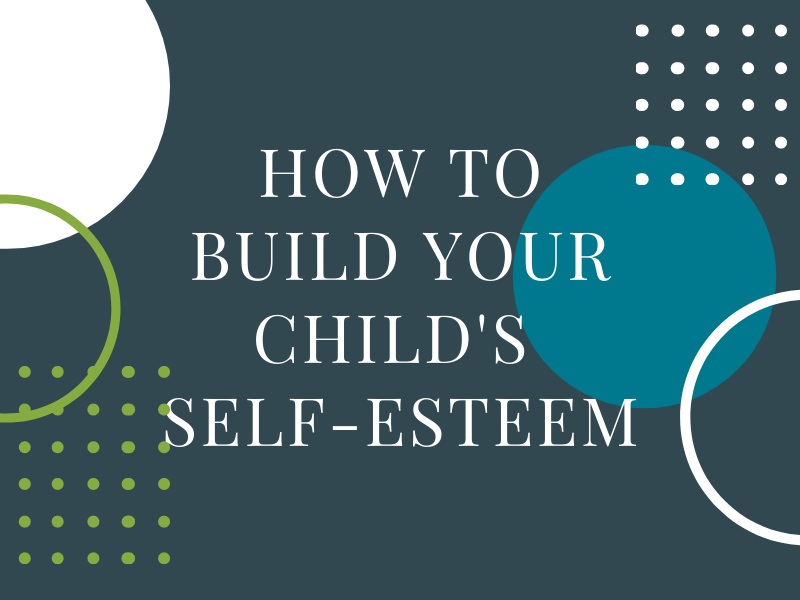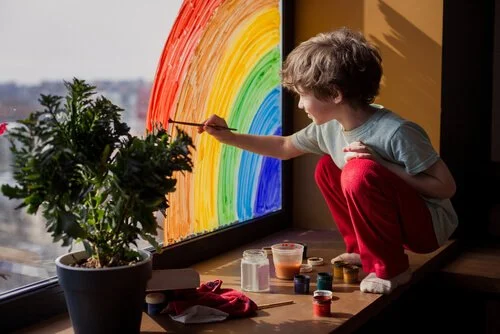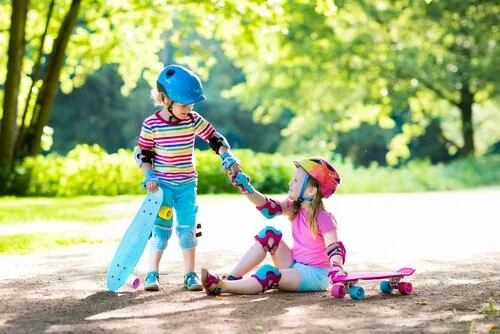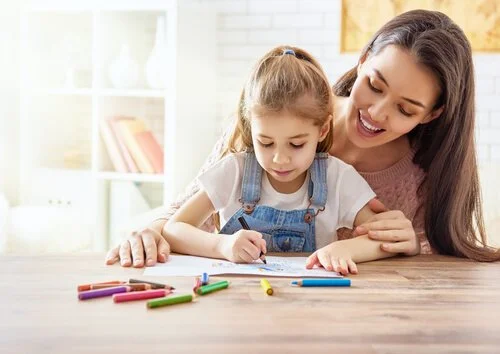How to Build your Child's Self-Esteem
HOW TO BUILD YOUR CHILD'S SELF-ESTEEM
As a parent, it is only natural that we want to build confidence and a positive self-esteem in our children. After all, confident children believe in their abilities and are able to tackle new challenges head-on without fear.
When I recently asked my Parent Support community if their child struggled with confidence, the results were balanced with half of the parents answering yes, and the other half no.
Often, our children's confidence can get knocked and our child's feelings hurt. This is a normal part of growing up however can cause some children to suffer from low self-esteem.
It’s natural for parents to want to find ways to improve their child’s confidence and to help them feel better emotionally.
How to help your child build their self-esteem
In this article, I will share with you what self-esteem is, why it matters, what can cause low self-esteem and how parents can help to boost confidence in their children as well as some things your child can do to build self-esteem for themselves.
What is self-esteem?
Self-esteem is a way of thinking, feeling and acting that implies that you accept, respect and believe in yourself.
When a child's confidence is high, it makes them feel valued and boosts their self-belief, ability to perform and overall psychological health.
To believe in yourself is different for both adults and children however it can mean that you have the confidence to make choices and take actions that will have a positive effect or impact on your day-to-day life.
Newborns and young babies don’t really have self-esteem. That’s because they don’t yet see themselves as being their own person. But you can still lay the foundations for healthy self-esteem by comforting them when they are upset or unsettled and changing and feeding them when needed.
When we respond in a loving and consistent way, our children’s self-esteem and self-worth grow and nurture and we can continue to provide this throughout their lives in a variety of ways.
As children get older and develop their own personalities they thrive in their own unique way. For children to thrive, they need to trust in their own capabilities while understanding that if something does get in their way they can still do it. By failing, children can bounce back and learn to build healthy self-esteem.
What are the causes of low self-esteem?
This will vary depending on the age and stage of your child and there is no one reason, Raisingchildrenau.net puts it quite logically for preschoolers
“They often like to compare themselves with others, and will ask whether they’re the biggest, fastest or best at whatever they’re doing”
For older children or adolescents confidence or self-esteem can often be low because they can’t help but compare themselves to others, whether that be with their friends, siblings, socially or academically. What can often unintentionally happen also is that if a parent compares siblings without realising, it can have an impact on how they feel about themselves.
Believe it or not, praising kids can also have a negative effect on self-esteem. Research has shown that overly positive praise sets unattainable goals for children and can lower their self-esteem.
In some cases, a child may have experienced trauma in their lives, for example, abandonment or neglect.
Again, in some cases parental relationships can also be a cause, this can be due to parental conflict and regular arguments in front of the children or if they show little or no support for their child’s small or big achievements.
What are the signs of positive self-esteem?
When your child values themselves and has positive self-esteem, they will feel good and generally feel confident in their abilities. Other signs include:
The child will often feel proud of their achievements, no matter how big or small they are.
They mostly believe in themselves even when they are being challenged.
They see the positive in things and accept that not everything will go to plan!
They are comfortable in their own skin and, therefore, feel liked and accepted by family and peers.
They acknowledge that mishaps or mistakes can happen and when they do, it’s ok.
What are the signs of low self-esteem?
Signs for children with self-esteem or low confidence will vary so it will never be the same for everyone, like us all, we have good days and bad. These are taken in the context of broadly speaking so, therefore, are not applicable in each case.
The child avoids a task or challenge, this often signals a fear of failure or a sense of helplessness or they may quit soon after beginning a game or a task, giving up if they begin to feel frustrated.
When self-esteem is low we don’t fully appreciate its value.
The child withdraws socially, losing or having less contact with friends.
The child may regularly feel sad, cry a lot, have angry outbursts, feel frustration, or is simply noticeably quiet or withdrawn.
The child makes self-critical comments, such as "I never do anything right," "Nobody likes me,". Read my blog How to help your child self-talk.
The child has difficulty accepting either praise or criticism.
They become overly concerned or sensitive about other people's opinions of him or her.
(Reference: healthychildren.org)
How to encourage genuine self-esteem
From an early age, it’s important to positively challenge your child while also encouraging them to take as much responsibility as they can for themselves, in other words not doing anything for a child that they can do for themselves. I know it can be easier to do things for our kids because it doesn’t take as long or sometimes we think they are not able to accomplish a task or manage a conversation by themselves so we carry them along to achieve.
My point is that often we can find ourselves unintentionally supporting the child’s lack of esteem by doing everything we can to make them feel good about themselves, not challenging them to try or give up at the first hurdle, the simple daily tasks of getting dressed, tidying away their belongings, not involving them in household jobs, the older child making their lunch or having the correct books in their school bag to the more social scenarios like settling an argument with a friend or siblings sorting out things by themselves.
Parents want their children to have a stable sense of self-worth. Parents want them to recognise that they have their own talents and unique ways that are not going to always be the same as others and it’s important we tap into that niche, talent, strengths or what makes them feel good, so we can encourage it without taking over.
What can I say to my child to help build their self-esteem?
Words of encouragement and positive affirmations from parents are incredibly important for ensuring that your child has a healthy sense of self. The below words and phrases are some great things you can keep in your parenting resources to show your children how loved they are.
I love you
Remind your child every day that they are loved and accepted for who they are. When children feel safe and secure, they are free to focus on learning, developing and growing.
It's ok to make mistakes, that's how we learn and grow
Teach your little one that everyone makes mistakes and that it's okay to! Mistakes help your child learn and discover new ways of doing things. The best thing you can do here is lead by example. If you make a mistake, acknowledge it and show your child how you can do it differently next time.
I'm proud of you
There's nothing wrong with showing how proud you are of your child for what they have accomplished, but regardless of whether or not they do something that makes you beam with pride, they still need to know that you are proud of them no matter what.
14 ways to help children build on their self-esteem
Self-esteem is important for your child's confidence and their ability to overcome challenges.
Participation and overcoming problems, asking for help, and receiving appropriate support are all positive takeaways that build self-esteem and self-confidence, whether successful or not. The caregiver’s challenge is to balance between being supportive, overprotective, and realistic.
The following are all factors that can positively influence the growth of a child’s self-esteem and encourage them to believe in themselves:
1. Step back
Although it may come naturally, praising our children for everything they do can at times have the opposite effect, as we know, nobody is great at everything and there will be times in our lives when we experience disappointment and upset.
If you allow yourself to step back it allows your child to take risks, make choices, solve problems and experience challenges. Confidence comes from doing, trying and failing and trying again—from practice.
2. Let your child make healthy choices
Allowing your child to make age-appropriate choices on a regular basis not only provides healthy control but also gives them a boost too, for example, being part of the family rule making, helping with dinner, choosing a family activity, talking through with you how they can deal or approach a certain social situation to showing and acknowledging initiative for a change they have worked towards. Ask them, what might be helpful? If they say ‘I don’t know’, be prepared to challenge them a little on it.
3. Show your own confident side
It’s ok to acknowledge to our children that we have feelings of doubt sometimes but don’t continually dwell on it, when our children see us approach new tasks with preparation it sets a good example for them. That doesn’t mean you have to pretend to be perfect, focusing on the positive things of a task outweighs the negatives.
4. Help your child find their own talents
This often may mean noticing what drives and interests your children and encouraging them to become involved in activities that express this. We all know when you are passionate about something that it will drive you more. It’s very much a positive when our children are being challenged and need to put effort into something, that’s when they feel a sense of achievement. Examples can be not only sport but using their creative side like in art, dance and drama, scouting and guiding, solitary activities like reading, Lego building even caring for others.
If they find that spark or passion and join a club or organisation it’s also the opportunity to connect with children who are like-minded, it’s an opportunity to make friends outside of school too. Doing the things that we love is the best way to connect with others.
5. Helping others
Self-esteem is not always a life skill that grows by itself, it is about being proactive, being courageous at times using empathy and using their talents to help others. It is a huge boost to a child’s self-esteem to know that what they are doing matters and makes a difference. This might come in the form of donating their toys, organising a sponsored walk to raise money or helping a neighbour with shopping, especially now as Covid has identified how much we can do for one another.
Making a contribution or making a difference to something worthwhile is another way for them to find out what their strengths are while also giving them a boost.
6. Let kids take responsibility
The earlier we can start encouraging our children to do things for themselves the better, this is as small as the toddler years, getting dressed, tidying up their toys etc.
Take time to teach your children their new responsibilities. Instead of focusing all their energy on what they already excel at, it’s good for children that gain new skills or responsibilities to feel capable and confident so that they can tackle whatever comes their way. It also provides them with a sense of control, which helps to develop confidence and a sense of self. Children become responsible when given responsibility.
7. It's OK to show fear
Let your smaller child explore their environment, but be ready to respond if they need you, for example, when a bee is nearby say ‘thank you for the honey’ as opposed to whooshing them away, our children need us to let them know it’s OK! Consider your own expectations for your child in social situations, they don’t have that ability to share or play directly with other children until they are three years so remember some shyness can be their developmental stage.
For the older child, worries and anxieties play a bigger role as they begin to form friendships in the primary school years – see a recent Q&A with Richard Hogan, Family Psychotherapist on Building Resilience. This will help you understand how we can support our children’s resilience in more detail. Laura Crowley of The Social Connect Series supports children who find connecting socially with others a challenge find Laura @social_connect_series on Instagram
There is a great book that I also recommend for 6 -12 year olds called ‘what to do when you worry too much’ by Dawn Heubner, it’s a self- help book that supports children to overcome their anxieties.
8. Embrace imperfection
Adults know that perfection is unrealistic, and it's important for our children to understand that message too. Help children to see that everything they see on TV, in magazines, or on social media isn't always the truth.
Instead, remind them to embrace their imperfections and that it's okay!
9. Acknowledge perseverance with your child
As we know it is easy to give up at the first setback, something that adults are familiar with too, but it is an important life skill that we learn from early on and for many want to instil in their children.
Confidence and self-esteem are not about succeeding at everything all the time, it is about practising that resilience to allow yourself to keep trying, and to keep those negative thoughts at bay!
10. Let your child make mistakes
It’s natural to want to protect your child from failure, but trial and error is how kids learn, and falling short on a goal helps kids find out that it’s not fatal. It can also spur kids to greater effort, which will serve them well as adults.
11. Let Them Create and Show Off Work
When your child creates artwork or writes a story, ask your child to tell you about it. Ask why they have done it, how it makes them feel and what they like best about the work they have done.
Giving your child a chance to talk about their work and show it off lets them know that their hard work is worthwhile. It also gives them the impression that their thoughts matter and that their work is important to you.
12. Show them that you love them everyday
Showing how much you love your children helps to give them a sense of security and belonging. This is incredibly important to their view of themselves.
The love you show your child helps to set the foundations for healthy relationships they will form later on in their lives.
Doing simple things like hugging your children goodbye, cuddling them whilst reading a book at night and telling them you love them each day is important. As your children get older, this love and security will help them to with feeling good and making their own friends and social circles.
13. Have fun together
When you play and have fun with your child, it shows them that you enjoy spending time with them and that you appreciate their company. Having fun with them has plenty of benefits for you both.
Not only do children develop confidence in their ability to be sociable and entertaining people, but research has also shown that children who are happy also grow up to be less depressed, less anxious and less stressed.
14. Give them set times to use technology
We're all constantly connected to our devices. Mobile phones, laptops, and tablets are convenient as they allow us to stay in touch with one another but all this connectivity can be damaging to our mental and physical health.
To combat this, decide what type of activity is necessary for your child and what is to pass the time. Then come up with a plan for set times to use technology. Mix it up with some outdoor activities such as walking and riding bikes as this can have a positive effect on your child's mental health and overall confidence too.
Recommended reading to encourage self-esteem for younger children
Perfectly Norman by Tom Pericival
Can I join your club? by John Kelly
A way with wild things by Larissa Theule
The koala who could by Rachel Bright
Affirmation Cards
I’m a big believer in using affirmation cards for adults and children. By encouraging our children to create their own inner self-belief, self-love and learn positive self-talk, our children will develop healthy mental and emotional pathways. There is a lot out on the market, one Irish company, Louise Murphy of ‘Happyosity’ has created lovely ones which you can purchase on the website.
When we see our children struggle in any aspect of their life, it’s hard. We also do our best to support and help them. Sometimes the answer is not always straightforward but more so slow building which can take time. Right now many children are finding lots of things tough, it’s different for everyone, it’s finding what works for you and your family that’s important and persevering with it as best as possible.





